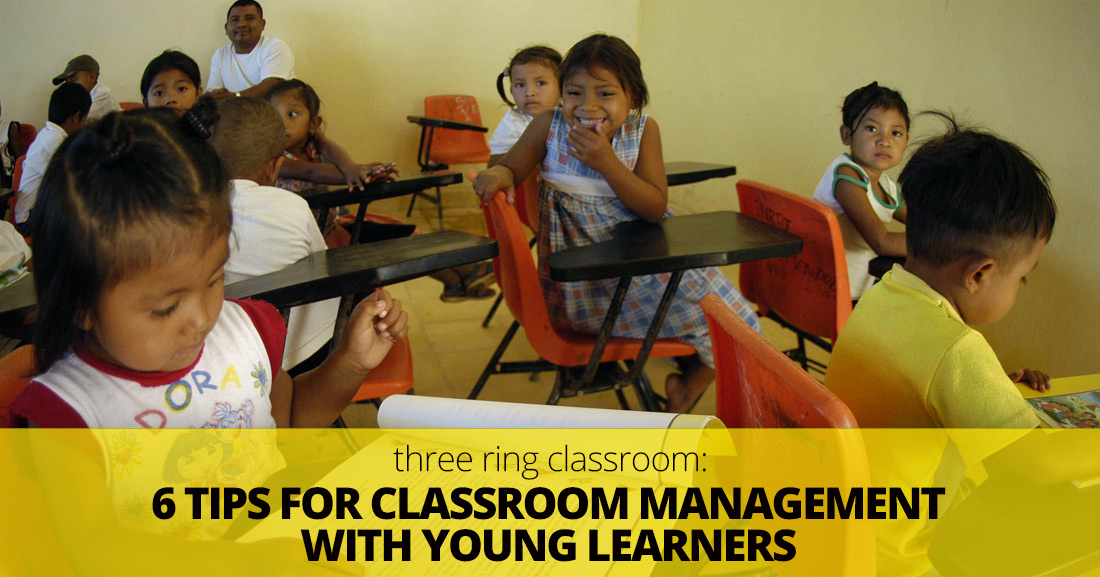Three Ring Classroom: 6 Tips for Classroom Management with Young Learners


An educator is more than someone who shares information in a particular subject. A teacher is someone students look to for guidance. Often is the case that we are not able to reach every single student, but this doesn't mean that we stop trying. Changing the future of even one kid on the wrong path, is success. Every year we get a new group of kids. Most of them are fairly attentive and understand that school is their "job". But of every group, there is at least one who has no desire to learn, he/she is simply there because Mom makes him/her show up everyday.
Sometimes I am successful, other times I find myself beating a dead horse. But I refuse to give up on these kids, there are reasons for their inability, or lack of desire. Pin-pointing the reason is the first step in changing the habits. I have found that generally the source of a bad attitude comes from a child not understanding what is being taught. It is easy to get frustrated when we don't understand things, and a natural defense mechanism to act like we don't care instead of showing our vulnerabilities.
When I was a student, I remember watching kids be pulled out of class to attend special classes. Some of them were smarter than the rest of us and went into "challenge" classes. I was envious of those kids, and wanted to be able to join them. I received straight A's, so I didn't understand. I felt inadequate and that didn't feel good. On the reverse side, there were students that had to go to resource classes because they didn't read as well, or maybe it was a speech problem. Whatever the learning disability was, they were singled out and removed from class. At a young age, this didn't make sense to me. They needed extra attention, that I understood. However, was missing our class time hurting them?
I use this view still today. Allowing Sally to be pulled away from her peers and made to feel like an outcast is just unacceptable. This is embarrassing to a young mind, and often one of the things that leads them to giving up. Not too mention, when she returns we have to fill her in on the things she missed. Instead, I use before and after school hours for my students.
Another thing that I have learned over the years is that being stuck inside four walls for an entire day, with the exception of a recess break can make children (and adults) go stir crazy. Taking your science class outdoors is a great way to peak interest and cure boredom. This is a technique that has been used for years, but should not be limited to science lessons. By moving lessons outdoors into fresh air, your students are more apt to pay attention. Create a scene that is conducive for even the most restless of minds.
Interactive learning is possibly the best technique that we have at our fingertips. Children love video games. Find sites that offer educational games. Even if you can't monitor the progress, you can quiz your students on what happens when the game is complete or what happens after a certain level. This will tell you whether they understand the game and the lessons involved. If they were unable to pass level 5, well then you know what you need to work on.
Recently, I ran into a former student who was one of them I did reach. She let me know that she had graduated high school and would be attending Sanford Brown in the fall. I could not have been more proud. I had become quite fond of this child during the year she was in my class. She was extremely talented, and had a good heart. However, dyslexia had been keeping her from reaching her potential. She thanked me for all of my work with her, and let me know that it was me who had changed her path, and had given her a thirst for knowledge. That, to an educator, is success.
Don't be afraid to get weird. Dress up as the character in the story you are studying. Making your children laugh is a sure way to know they are engaged. Keeping your classroom confined to strict guidelines will cause boredom. Pay attention to what makes their eyes light up and build off of that. If you find yourself stuck on your favorite idea, give it to another teacher and let go of it. In return, ask them for their favorite teaching technique and give that a try.
This is a guest article by Rebecca Wilcox.